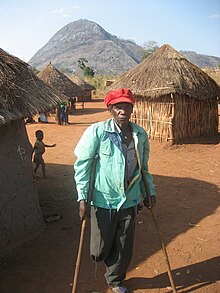| Mozambican Civil War | |||||||
|---|---|---|---|---|---|---|---|
| Part of the Cold War | |||||||
 Mozambican victim of land mines set up during the war | |||||||
| |||||||
| Belligerents | |||||||
|
|
| ||||||
| Commanders and leaders | |||||||
|
|
(RENAMO) (RENAMO) Amos Sumane (PRM) Gimo Phiri[9] (PRM, RENAMO, UNAMO) | ||||||
| Strength | |||||||
|
| ~20,000[10] | ||||||
| Casualties and losses | |||||||
|
| Unknown | ||||||
| Total killed: 1,000,000+ (including from famine) | |||||||
The Mozambican Civil War (Portuguese: Guerra Civil Moçambicana) was a civil war fought in Mozambique from 1977 to 1992. Like many regional African conflicts during the late twentieth century, the impetus for the Mozambican Civil War included local dynamics exacerbated greatly by the polarizing effects of Cold War politics.[5] The war was fought between Mozambique's ruling Marxist Mozambique Liberation Front (FRELIMO), the anti-communist insurgent forces of the Mozambican National Resistance (RENAMO),[15] and a number of smaller factions such as the PRM,[16] UNAMO,[1] COREMO,[3] UNIPOMO, and FUMO.[4]
RENAMO opposed FRELIMO's attempts to establish a socialist one-party state, and was heavily backed by the anti-communist governments of Rhodesia and South Africa who supported them in order to undermine FRELIMO's support for militant nationalist organisations in their own countries.[5] Over one million Mozambicans were killed in the fighting or starved due to interruptions to food supply; an additional five million were displaced across the region.[17][18] The Mozambican Civil War destroyed much of Mozambique's critical infrastructure in rural areas, including hospitals, rail lines, roads, and schools.[15] FRELIMO's security forces and RENAMO insurgents were accused of committing numerous human rights abuses, including the use of child soldiers and indiscriminately salting a significant percentage of the countryside with land mines.[15] Three neighboring states—Zimbabwe, Tanzania, and Malawi—eventually deployed troops into Mozambique to defend their own vested economic interests against RENAMO attacks.[15]
The Mozambican Civil War ended in 1992, following the collapse of support from the Soviet Union and South Africa for FRELIMO and RENAMO, respectively.[5] Direct peace talks began around 1990 with the mediation of the Mozambican Church Council and the Italian government; these culminated in the Rome General Peace Accords which formally ended hostilities.[15] As a result of the Rome General Peace Accords, RENAMO units were demobilised or integrated into the Mozambican armed forces and the United Nations Operation in Mozambique (ONUMOZ) was formed to aid in postwar reconstruction.[15] Tensions between RENAMO and FRELIMO flared again between 2013 and 2018, prompting the former to resume its insurgency.[19][20] This smaller second conflict ended with a peace treaty in 2019.[21]
- ^ a b c Emerson (2014), p. 163.
- ^ Arnold, Guy (2016). Wars in the Third World Since 1945. Oxford: Bloomsbury Publishing Plc. pp. 211–213. ISBN 978-14742-9102-6.
- ^ a b Banks & Muller (1998), p. 635.
- ^ a b c d Seegers (2018), Section: Independent Mozambique and the Role of the Armed Forces.
- ^ a b c d Schwartz, Stephanie (2010). Youth and Post-conflict Reconstruction: Agents of Change. Washington, D.C.: United States Institute of Peace Press. pp. 34–38. ISBN 978-1601270498.
- ^ War and Society: The Militarisation of South Africa, edited by Jacklyn Cock and Laurie Nathan, pp.104-115
- ^ "Mozambique: Civil war | Mass Atrocity Endings".
- ^ Cabrita (2000), pp. 128–129.
- ^ Emerson (2014), pp. 90–91, 163.
- ^ a b c "Our work | Conciliation Resources". C-r.org. Archived from the original on 29 December 2011. Retrieved 4 March 2012.
- ^ Bulletin of Tanzanian Affairs No 30, May 1988, pp 14
- ^ United States. Joint Publications Research Service, 1977, Translations on Sub-Saharan Africa, Issues 1742-1754, p. 13
- ^ Mozambique to return bodies of Tanzanian soldiers, Panapress, 2004.
- ^ "Afrikka" (PDF). Archived from the original (PDF) on 19 June 2018. Retrieved 18 January 2013.
- ^ a b c d e f Vines, Alex (1997). Still Killing: Landmines in Southern Africa. New York: Human Rights Watch. pp. 66–71. ISBN 978-1564322067.
- ^ Cabrita (2000), pp. 128–130.
- ^ "Mozambique". State.gov. 4 November 2011. Retrieved 4 March 2012.
- ^ "MOZAMBIQUE: population growth of the whole country". Populstat.info. Archived from the original on 19 February 2017. Retrieved 4 March 2012.
- ^ Fauvet, Paul. "Mozambique's Renamo kills three on highway". iOl News. iOl News. Retrieved 25 August 2014.
- ^ "36 Mozambique soldiers, police killed: Renamo". 13 August 2013. Retrieved 15 May 2016.
- ^ "Mozambique President, Opposition Leader Sign Peace Agreement | Voice of America - English". www.voanews.com. August 2019. Retrieved 28 July 2021.